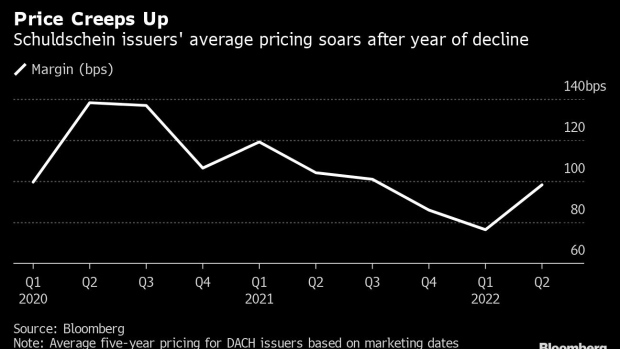Jun 18, 2022
Corporate Loan Rates Head Higher in Europe
, Bloomberg News

(Bloomberg) -- European companies could find it hard to bargain for the kinder interest rates that the relationship-driven corporate loan market typically offers, as inflation and tighter monetary policy begin to bite into their funders’ pockets.
Pricing is likely to rise for corporate loan borrowers in the near future, said Carlo Fontana, head of global syndicate at UniCredit SpA. “Banks’ cost of capital has gone up but it is yet to filter through,” he said.
The first signs of increasing borrowing costs were seen in the bond market, with corporate issuers paying almost twice as much in the second quarter compared to the first for five-year transactions in euros.
Read more: High Price of New Debt Triggers Aftershocks in Corporate Credit
The average pricing of five-year Schuldschein notes, a niche debt market used mainly by firms from German-speaking countries, already witnessed a jump of about 29% in the second quarter versus the first.
Austrian utility EVN AV is marketing its second Schuldschein of the year at 105 to 120 basis points over mid-swaps for a 13-year tranche, compared to 70 basis points paid for a 12-year term just two months ago.
Borrowers in the BBB rating categories are offering banks a premium over the pricing levels prevailing before Covid, said Hedi Ben Salem, head of corporate lending for Europe and Asia at Banco Bilbao Vizcaya Argentaria SA, and the utilities sector is particularly affected by soaring commodity prices.
“A number of utilities asked for additional liquidity lines at a time of great uncertainty around the sector,” said Salem. “This had the immediate effect of changing the supply and demand balance in banks’ favor and led to an overall increase in pricing for the sector.”
Higher borrowing costs for corporate loans would be a u-turn from the start of the year, when issuers enjoyed pricing discounts after the Covid impact eased. They also would run counter to the market’s expectations at the end of last year, when 64% of respondents thought pricing would maintain the downward trend from 2021.
Besides inflation and tighter monetary policy, Russia’s invasion of Ukraine in February also has made banks more wary.
Read more: European Lenders See Refinancing Activity Lifting 2022 Deal Flow
“I think pricing a transaction in 2022, and especially since Feb. 24, needs heightened due diligence and customization,” said Lucie Campos Caresmel, head of EMEA corporate loan distribution with Credit Agricole Corporate & Investment Bank.
©2022 Bloomberg L.P.





